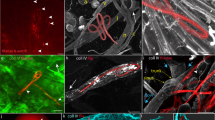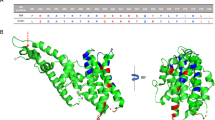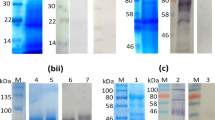Abstract
IN a previous article1 evidence was reported supporting the hypothesis that at least two immune responses occur against larval tæniid tapeworms in the intermediate host; and that these responses can be elicited by a single parenteral injection of homologous activated embryos in previously unexposed animals. The initial response appears to occur before the penetration of the hexacanth embryo through the intestinal barrier, and the later response occurs at the site of election against the growing metacestode.
This is a preview of subscription content, access via your institution
Access options
Subscribe to this journal
Receive 51 print issues and online access
$199.00 per year
only $3.90 per issue
Buy this article
- Purchase on Springer Link
- Instant access to full article PDF
Prices may be subject to local taxes which are calculated during checkout
Similar content being viewed by others
References
Gemmell, M. A., Nature, 194, 791 (1962).
Silverman, P. H., Ann. Trop. Med. Parasit., 48, 207 (1954).
Author information
Authors and Affiliations
Rights and permissions
About this article
Cite this article
GEMMELL, M. Species Specificity of the Immunogenic Complexes of the Tapeworm Hexacanth Embryo. Nature 204, 705–707 (1964). https://doi.org/10.1038/204705a0
Published:
Issue Date:
DOI: https://doi.org/10.1038/204705a0
This article is cited by
-
Vaccination against cestode parasites
Immunology & Cell Biology (1993)
-
Heterologous antagonistic and synergistic interactions between helminths and between helminths and protozoans in concurrent experimental infection of mammalian hosts
Parasitology Research (1987)
-
Species Specific and Cross-protective Functional Antigens of the Tapeworm Embryo
Nature (1967)
Comments
By submitting a comment you agree to abide by our Terms and Community Guidelines. If you find something abusive or that does not comply with our terms or guidelines please flag it as inappropriate.



